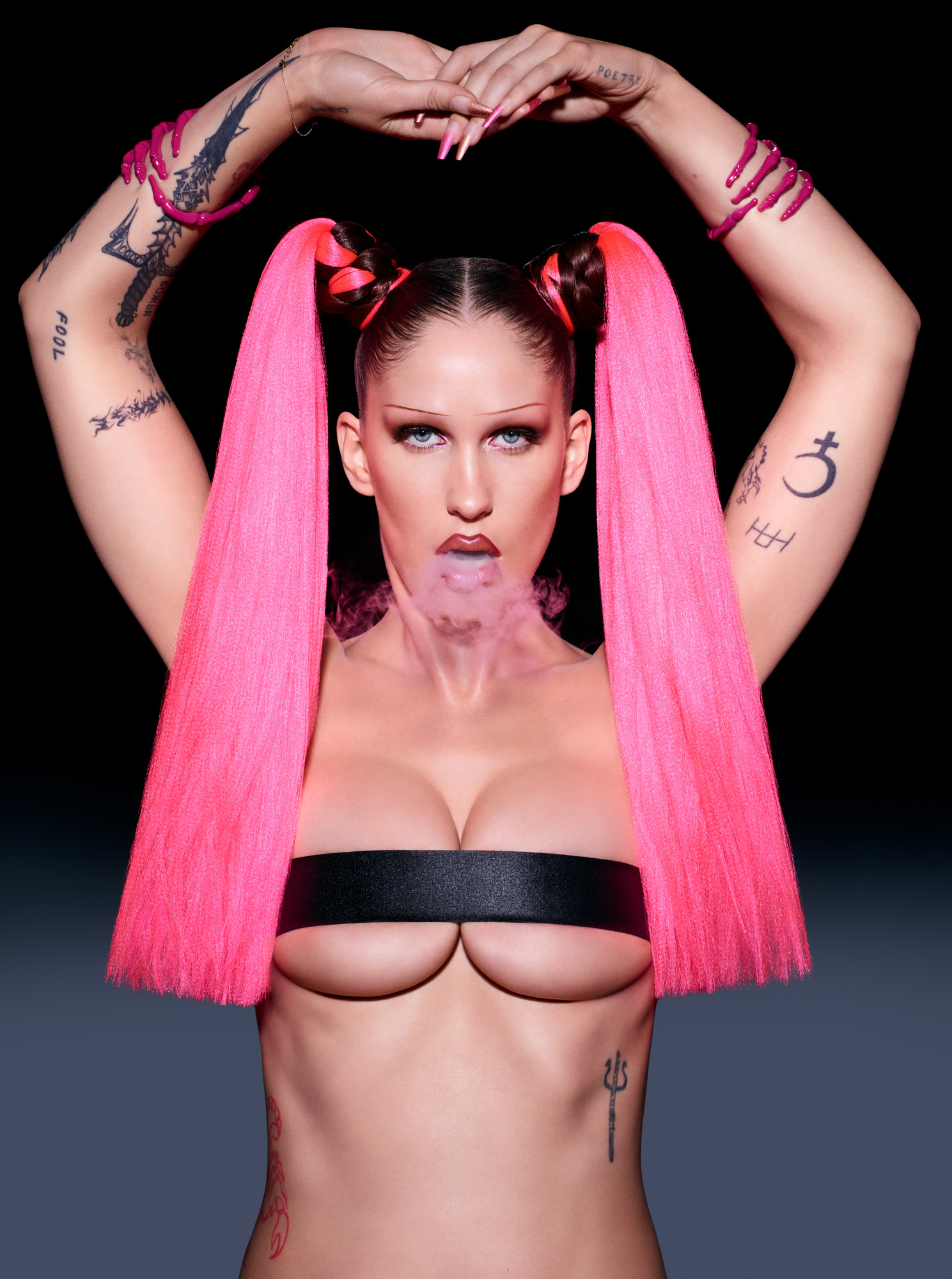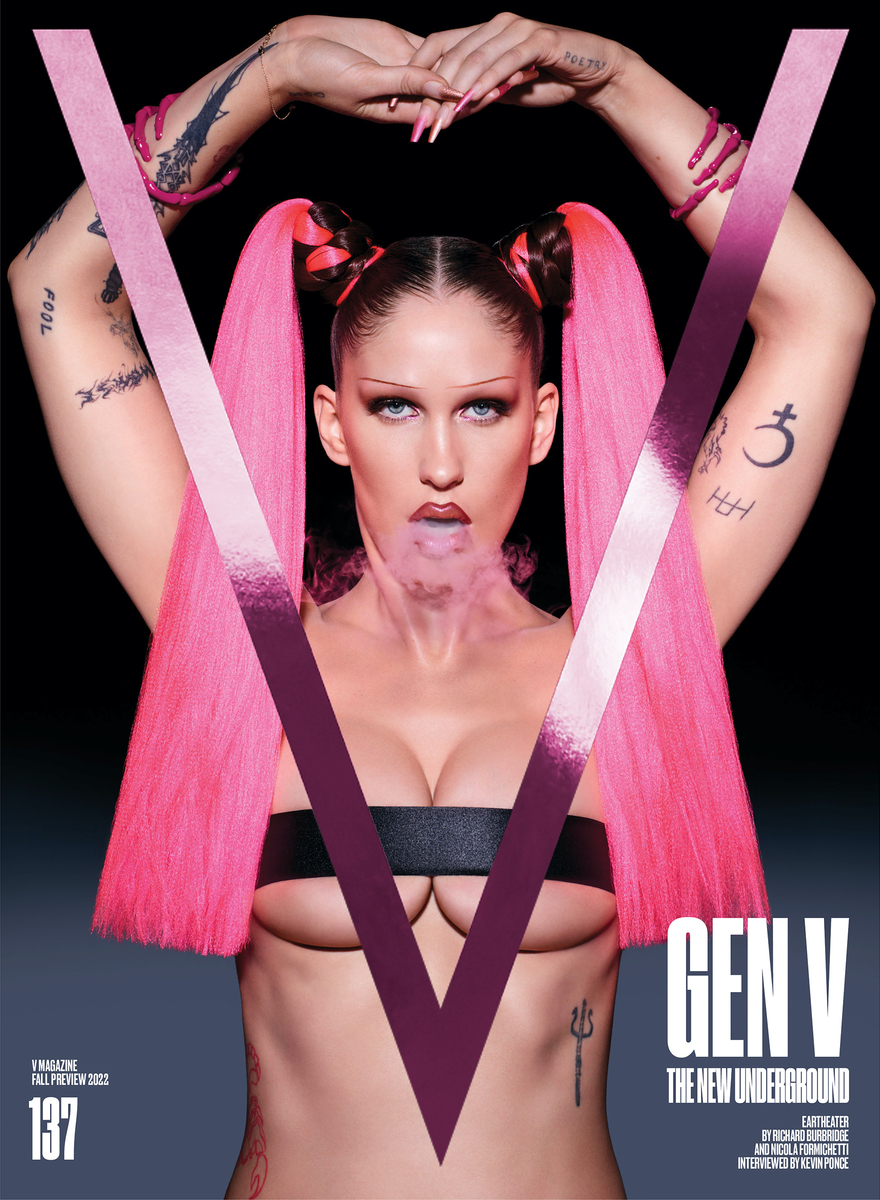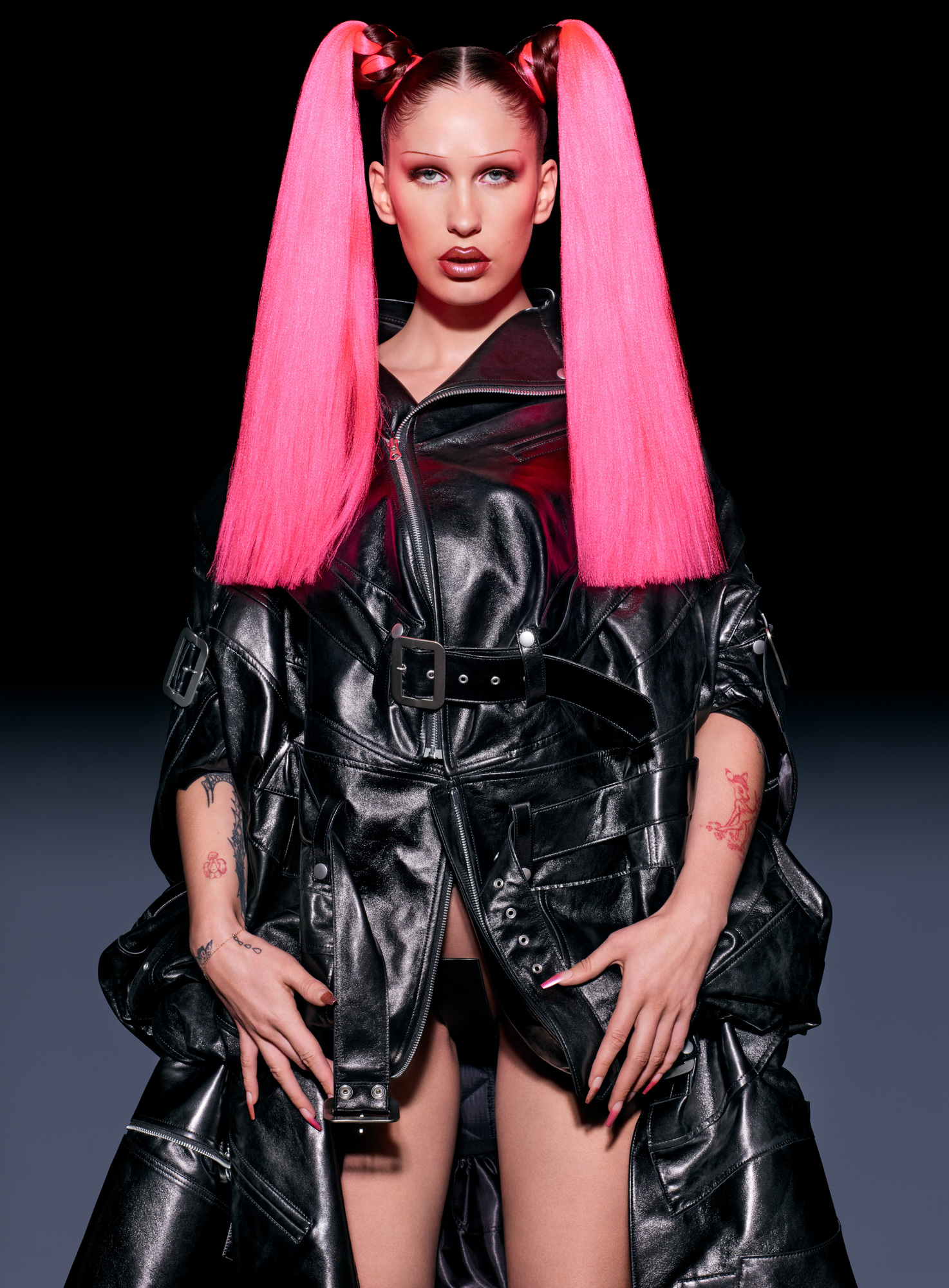V137: Eartheater (GEN V)
Fellow earthlings—feast your eyes on one of music’s most transcendent artists around

“Who the fuck is Eartheater” you may ask? If there’s anything you should know about the mind-blowing musician that’s got the industry buzzing about her experimental sound and look, is that she’s everything you don’t expect (and then some). ”When I thought of the moniker, I conjoined the words “Earth” and “Eater” into one. There are many anagrams in the name Eartheater, such as heat, heart, art, e-art, hearth, ear theater—all things that resonate with me. [Even] the family of worms that break down dead matter into nutritious soil are called Eartheater worms.” As peculiar as her stage name may be, her connection to nature echos her early upbringing in rural Pennsylvania. “I’m a first-generation American. My father escaped the Soviet Union in 1981 and met my English mother in New York. My mother found property right over the Delaware River with an old barn that she converted into the house I grew up in.” Surrounded entirely by horses on acres of farming land, her challenging upbringing, which saw her going from life on the prairie to moving around while attending public school, helped propel her life’s focus towards music. “I feel like the meteor of Eartheater for a lot of people was when I dropped Trinity. It was finally when I could open up and collaborate, and it was my first completely independent release that I dropped on my own label, Chemical X.” Now having accumulated a legion of loyal listeners from around the globe (and galaxy perhaps) in the years following, there seems to be no signs of this evolving supernova slowing down anytime soon.

“Pink is the sexiest. During the period when I put out my first albums as Eartheater, I only wore pink. I had pink hair. Literally, everything was pink. It’s [also] the combination of red, which is the color with the longest, most penetrating light rays, and white, which is all the colors of the rainbow combined.”
Below, discover an extended Q+A with Eartheater !
V Magazine: Since our new cover series is all about the new generation, what comes to mind when you think of the words “Gen V”? What is it about the current generation that makes it so exciting to be a part of?
Eartheater: Thank fuck, I was born to be a part of this time and not not the past—not going to find any nostalgia here. V Are looking forvard! *laughs* No, not the German accent, anyways! In spite of the darkness, still, all the suppressed nutrients are receiving more light than they did in the past and that photosynthesis is expediting evolution through this generation. I always loved the fact that flowers evolved more recently than dinosaurs, and I like to see it as a metaphor sometimes—let these old reptilian fascists die and leave us alone. The exponential, technological curve we’re surfing as a generation has thrust us into bloom and into unprecedented levels of communication, much like a neural network or mycelium, is unfolding. The letter V even looks like a symbol of expanding and growing.
V: We gotta talk about this name: Eartheater. What’s the origin story there? Where did you come up with this moniker?
EE: It first came [to me] when I was reading the book 100 Years Of Solitude. There is a character that eats dirt and paint chips that I related to emotionally. When I thought of the words “Earth” and “Eater” and then conjoined the two into [one] moniker Eartheater, I saw it also read as “ear theater”. As an artist, I love to show the multiplicity of things and leave Easter eggs for people to discover. There are many anagrams in the name as well like heat, heart, art, e-art, hearth—all things that resonate with me. I did some research and found that the family of worms that break down decomposing dead matter into nutritious soil for a new life is called eartheater worms. I love thinking of this simple tubular toil of the eartheater worm and its work to build a beautiful world. Then, of course in total contrast, the name could entertain the vision— performance, fantasy, entertainment—of a galactic entity swallowing whole planets. I like the spectrum of extremes it allows me, suspended between the micro and the macro. I never want to feel confined or limited in my work.
V: Could you describe what your upbringing looked like, having been raised in Pennsylvania, NY, London, and beyond? How did it affect you in a personal way?
EE: I’m a first-generation American. My father escaped the Soviet Union in 1981 and met my English mother in New York. My mother found a very cheap piece of property right over the Delaware River with an old barn that she converted into the house I grew up in. The best thing about that house was that she kept the stables on the first floor so you didn’t even have to leave the house to be with the horses. I was homeschooled and it was my job to take care of the animals so it feels like I spent just as much, if not more, time with horses growing up than I did people. I started working at another stable, mucking stalls in exchange to ride some really special show jumpers, warmbloods, and thoroughbreds. At a certain point, probably when I was like 12 or 13, they eventually did start to pay me. I got $100 to braid a mane and $100 to braid the tail for shows. I was stoked. I thought I’d spend the rest of my life growing and working in that world. But then some shit hit the fan, my mom had to sell the farm, and I had to go into public school. We were moving around, I got super depressed, and discovered the kind of forcefield that music gave me.
V: How did you come to find that music was your path in life? Did you think music was always written in the stars for you?
EE: I honestly wanted to be a visual artist at first but stuff was so rocky, domestically, during those late teen years. The public schools I was going in and out of didn’t know how to nurture my spirit and help me build, and neither my mother nor father was around, so music was just easier to find community in. I moved to the city at 18 and just started playing in bands and touring in vans with smelly boys. I had big dreams, but I also knew I needed to spend a few years just keeping my mouth shut, observing and learning, before making my own moves. There were definitely multiple times that I would give my creative opinion but I’d always get shut down and pushed to the back, so I learned quickly not to waste my energy fighting battles that weren’t going to serve me in the long run. I just needed to learn the crux first—like how to plug in a mixer or speak to a sound person. Then eventually, my gaskets were starting to blow. I was so depressed and annoyed. I had recorded a whole album in a studio with annoying know-it-all men — spent all my money on it that I’d made working lots of shitty jobs — but it just didn’t feel right. Then one day, hanging on by my last thread, I realized that all the silly little demos in GarageBand that I recorded alone in my room were actually fucking gorgeous. I put out two albums that year and they got loads of good press, so I got picked up by a European booking agent, and from that point on, it was a wrap. I was finally doing me as Eartheater with the breeze in my hair.

V: Did your upbringing have any impact on your artistry and how you approach sound today?
EE: The lack of stimulation being so sheltered and far away from everything probably has something to do with my insatiable appetite to keep pushing and reaching and growing and wanting more.
V: You crashed into the music scene like a meteor hitting earth (no pun intended). Could you walk me through what the early stages of your musical career were like? Did you find it difficult to creatively collaborate with people who didn’t get your vibe?
EE: Yes, I was kind of traumatized by the shit I had to put up with in my early years of working in music with other people, so for a while, I did everything myself and hardly ever collaborated. I wonder when exactly you’re thinking the meteor crashed. I would love to think it was when I did my first open mic. The day after, I picked up a guitar for the first time. I played “Kiss Me” really badly — but I was hooked and obsessed. I couldn’t even feel embarrassed or self-conscious. I feel like the meteor of Eartheater for a lot of people was when I dropped Trinity. It was finally when I could open up and collaborate, and it was my first completely independent release that I dropped on my own label, Chemical X.
V: Your music tracks all the way back to around 2009 when you were releasing mixtapes and albums with international independent labels. With record labels notoriously being so restrictive with their artists, and with you having such an experimental sound, how important is it for you to continue working with people who get what you’re trying to say and put out there?
EE: V stands for very important.
V: Having gained a loyal following throughout the years, I want to know about the progression of your fan base. How have you seen it evolve on a broader scale? What makes your fan base so different from others?
EE: My fans are all different, they’re so fucking cute. There are obviously the teens and the throbbing youth, who I love so much, but there are the old heads too, and the moms, and the actual children, and the fashion bitches (who pay my bills, thank you very much) and then the regular-degular, hard-working people that purely just need to hear good music to lubricate their lives and process their emotions in an unconscious, un-sceney way, all around the world.
V: Having experienced a lot in your life, what’s been the most profound discovery you’ve made about yourself in these past few years?
EE: That the body is a wand and that magic is real. I’ve been more and more blown away that the intentions I placed in trusting my gut have given birth over and over into more and more. If I keep going no matter how hard it gets, I always end up eclipsing my own fantasies and dreams.
V: What do you hope your impact will be in music and art in the years to come? How do you want to be remembered, decades from now?
EE: I already know that I’m going to be remembered as a very important artist who created her own dynasty from deep in the underground up to the canopy, or a can of pee. I don’t know, we’ll see. Beep beep!
Discover More
